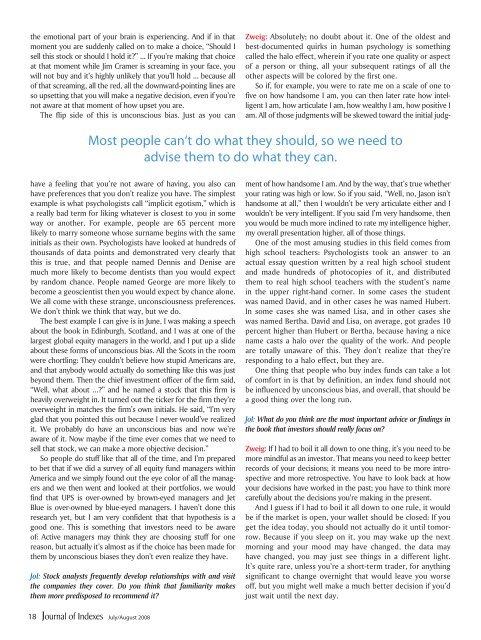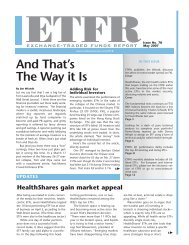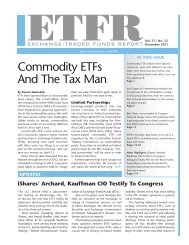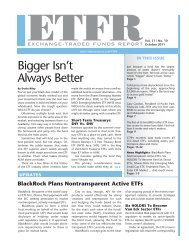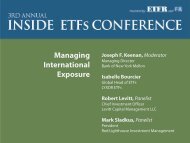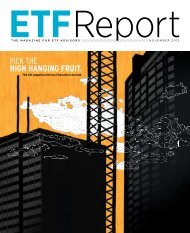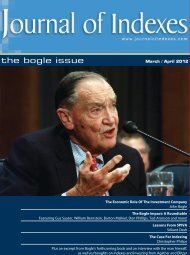Download - IndexUniverse.com
Download - IndexUniverse.com
Download - IndexUniverse.com
You also want an ePaper? Increase the reach of your titles
YUMPU automatically turns print PDFs into web optimized ePapers that Google loves.
the emotional part of your brain is experiencing. And if in that<br />
moment you are suddenly called on to make a choice, “Should I<br />
sell this stock or should I hold it?” ... If you’re making that choice<br />
at that moment while Jim Cramer is screaming in your face, you<br />
will not buy and it’s highly unlikely that you’ll hold ... because all<br />
of that screaming, all the red, all the downward-pointing lines are<br />
so upsetting that you will make a negative decision, even if you’re<br />
not aware at that moment of how upset you are.<br />
The flip side of this is unconscious bias. Just as you can<br />
Most people can‘t do what they should, so we need to<br />
advise them to do what they can.<br />
have a feeling that you’re not aware of having, you also can<br />
have preferences that you don’t realize you have. The simplest<br />
example is what psychologists call “implicit egotism,” which is<br />
a really bad term for liking whatever is closest to you in some<br />
way or another. For example, people are 65 percent more<br />
likely to marry someone whose surname begins with the same<br />
initials as their own. Psychologists have looked at hundreds of<br />
thousands of data points and demonstrated very clearly that<br />
this is true, and that people named Dennis and Denise are<br />
much more likely to be<strong>com</strong>e dentists than you would expect<br />
by random chance. People named George are more likely to<br />
be<strong>com</strong>e a geoscientist then you would expect by chance alone.<br />
We all <strong>com</strong>e with these strange, unconsciousness preferences.<br />
We don’t think we think that way, but we do.<br />
The best example I can give is in June, I was making a speech<br />
about the book in Edinburgh, Scotland, and I was at one of the<br />
largest global equity managers in the world, and I put up a slide<br />
about these forms of unconscious bias. All the Scots in the room<br />
were chortling: They couldn’t believe how stupid Americans are,<br />
and that anybody would actually do something like this was just<br />
beyond them. Then the chief investment officer of the firm said,<br />
“Well, what about ...?” and he named a stock that this firm is<br />
heavily overweight in. It turned out the ticker for the firm they’re<br />
overweight in matches the firm’s own initials. He said, “I’m very<br />
glad that you pointed this out because I never would’ve realized<br />
it. We probably do have an unconscious bias and now we’re<br />
aware of it. Now maybe if the time ever <strong>com</strong>es that we need to<br />
sell that stock, we can make a more objective decision.”<br />
So people do stuff like that all of the time, and I’m prepared<br />
to bet that if we did a survey of all equity fund managers within<br />
America and we simply found out the eye color of all the managers<br />
and we then went and looked at their portfolios, we would<br />
find that UPS is over-owned by brown-eyed managers and Jet<br />
Blue is over-owned by blue-eyed managers. I haven’t done this<br />
research yet, but I am very confident that that hypothesis is a<br />
good one. This is something that investors need to be aware<br />
of: Active managers may think they are choosing stuff for one<br />
reason, but actually it’s almost as if the choice has been made for<br />
them by unconscious biases they don’t even realize they have.<br />
JoI: Stock analysts frequently develop relationships with and visit<br />
the <strong>com</strong>panies they cover. Do you think that familiarity makes<br />
them more predisposed to re<strong>com</strong>mend it?<br />
Zweig: Absolutely; no doubt about it. One of the oldest and<br />
best-documented quirks in human psychology is something<br />
called the halo effect, wherein if you rate one quality or aspect<br />
of a person or thing, all your subsequent ratings of all the<br />
other aspects will be colored by the first one.<br />
So if, for example, you were to rate me on a scale of one to<br />
five on how handsome I am, you can then later rate how intelligent<br />
I am, how articulate I am, how wealthy I am, how positive I<br />
am. All of those judgments will be skewed toward the initial judgment<br />
of how handsome I am. And by the way, that’s true whether<br />
your rating was high or low. So if you said, “Well, no, Jason isn’t<br />
handsome at all,” then I wouldn’t be very articulate either and I<br />
wouldn’t be very intelligent. If you said I’m very handsome, then<br />
you would be much more inclined to rate my intelligence higher,<br />
my overall presentation higher, all of those things.<br />
One of the most amusing studies in this field <strong>com</strong>es from<br />
high school teachers: Psychologists took an answer to an<br />
actual essay question written by a real high school student<br />
and made hundreds of photocopies of it, and distributed<br />
them to real high school teachers with the student’s name<br />
in the upper right-hand corner. In some cases the student<br />
was named David, and in other cases he was named Hubert.<br />
In some cases she was named Lisa, and in other cases she<br />
was named Bertha. David and Lisa, on average, got grades 10<br />
percent higher than Hubert or Bertha, because having a nice<br />
name casts a halo over the quality of the work. And people<br />
are totally unaware of this. They don’t realize that they’re<br />
responding to a halo effect, but they are.<br />
One thing that people who buy index funds can take a lot<br />
of <strong>com</strong>fort in is that by definition, an index fund should not<br />
be influenced by unconscious bias, and overall, that should be<br />
a good thing over the long run.<br />
JoI: What do you think are the most important advice or findings in<br />
the book that investors should really focus on?<br />
Zweig: If I had to boil it all down to one thing, it’s you need to be<br />
more mindful as an investor. That means you need to keep better<br />
records of your decisions; it means you need to be more introspective<br />
and more retrospective. You have to look back at how<br />
your decisions have worked in the past; you have to think more<br />
carefully about the decisions you’re making in the present.<br />
And I guess if I had to boil it all down to one rule, it would<br />
be if the market is open, your wallet should be closed: If you<br />
get the idea today, you should not actually do it until tomorrow.<br />
Because if you sleep on it, you may wake up the next<br />
morning and your mood may have changed, the data may<br />
have changed, you may just see things in a different light.<br />
It’s quite rare, unless you’re a short-term trader, for anything<br />
significant to change overnight that would leave you worse<br />
off, but you might well make a much better decision if you’d<br />
just wait until the next day.<br />
18<br />
July/August 2008


